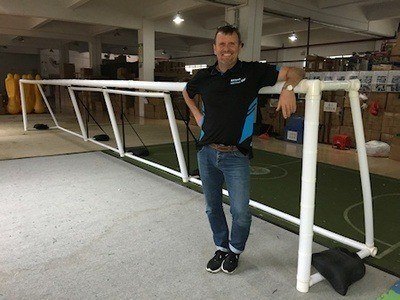Goalball UK Trials Revolutionary Portable Goalball Goals
Author: Packaworld
Published: 2018/05/07 - Updated: 2018/10/15
Category Topic: Sports News - Related Publications
Page Content: Synopsis - Introduction - Main
Synopsis: Newly-designed portable goalball goals could inspire blind athletes and help the sport of goalball to grow across the United Kingdom thanks to a trial supported by Goalball UK.
Introduction
Newly-designed portable goalball goals could inspire blind athletes and help the sport of goalball to grow across the United Kingdom thanks to a trial supported by Goalball UK.
Main Content
The national governing body for goalball has been using the lightweight nine-metre-wide courts produced by Packaworld International at South Yorkshire Goalball Club to help players build skills and offer a real-game experience. Goalball Packagoals inflate to nine metres wide, spanning the full width of the playing court, but deflate for transportation and storage.
What is Goalball?
Goalball is a team sport designed for athletes with vision impairments. Players compete in teams of three. Goalball originated as a rehabilitative sport for veterans who lost their sight following World War II. It became an official Paralympic sport in 1976.
Games consist of 12-minute halves, played indoors, usually on a volleyball court. Teams alternate throwing or rolling the ball from one end of the playing area to the other. Players remain in the area of their own goal in both defence and attack.
Today, the sport of Goalball is played at the Paralympic games, where 12 Men's teams and 10 Women's teams are eligible to compete against each other.
Making Goalball Setup Easier

Goalball UK National Development Manager Becky Ashworth says the trial Packagoal has made training sessions at South Yorkshire Goalball Club easier as it can be inflated in minutes, while conventional steel or aluminium goals take around half an hour to set up.
Ms Ashworth says the portable Goalball Packagoals can make the sport more accessible for new players. Improved ability to store goals on-site makes the goals well-suited for facilities lacking in storage space, while portability makes them and ideal for reaching out to local blind societies, schools and blind sport associations with taster sessions.
"Some clubs aren't able to store goals at their sites, and Packagoals could be very effective if people can just take them out when they want to play."
In goalball, teams of three players try to roll or bounce a 1.25kg ball with bells inside across an indoor court and into a nine-metre-wide goal. Opposing players try to block the ball from entering their net by diving. Blind and sighted players all wear blackout visors to create an equal playing field, relying on sound to identify where the ball is.
Ms Ashworth says goalball is especially good for the blind and low vision community because it has been designed specifically with low-vision players in mind. Players use and develop skills they have in their ordinary lives helping them to gain confidence and independence, improve their health, and connect with their community through teamwork.
Goalball participation has been growing rapidly in the UK. Since the 2012 Paralympic Games in London, Goalball UK has seen player numbers rise by more than 400 percent.
Many new clubs have been established, goalball is played at corporate team-building events and an ever-increasing number of people are approaching the association wanting to play the sport, Ms Ashworth says.
"A lot of clubs have been established, and increased demand is a challenge for us as an organisation. In places with no clubs, it can be tricky to connect people with goalball.
"It's a fun challenge to have, and we're always searching for ways to raise awareness. The response we usually get when we introduce someone new to the sport is along the lines of 'wow - I didn't realise what this sport was and how good it would be.'"
Goalball Packagoals have also recently toured New Zealand as part of a series of ACC Paralympics New Zealand Open Days.
Attribution/Source(s): This quality-reviewed publication was selected for publishing by the editors of Disabled World (DW) due to its relevance to the disability community. Originally authored by Packaworld and published on 2018/05/07, this content may have been edited for style, clarity, or brevity.